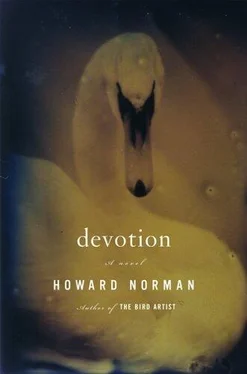William and Janice had not yet set foot in the main house; Stefania had delivered the dilapidated books to the front door only. But at the beginning of their third week at the estate, Isador invited them for coffee and raisin scones made by Dory Elliot. Before sitting down to talk, Stefania offered a tour of the house. The guest bedroom was on the first floor, along with the living room, dining room and kitchen, with its spacious pantry. On the dining room wall were two small oil paintings by Chaim Soutine, one of a fish, another of a garden near Paris. Neither Janice nor William had heard of this artist. Stefania took great pains to discourse on Soutine’s life, saying, “He was a great Jewish painter” and “He died after surgery in 1943 in Paris.” She loaned them a book of Soutine’s paintings, which they looked at that same night. The library, which was adjacent to the dining room, had floor-to-ceiling bookshelves and a rolling ladder.
Then they sat down and discussed salary and other details, and at the end of this, Isador said, “We feel comfortable having you take care of this property, and we hope you’ll accept. We intend to visit at least once a year, no doubt in summer, if we have the choice.”
Janice said, “And we’d like to visit Scotland once a year as well.”
“Two weeks vacation all right?” Isador said.
“Fine,” William said.
“We have no papers for you to sign,” Isador said.
“None needed,” William said.
Isador went into the kitchen, brought out a bottle of champagne, said, “It’s too early in the day for this, but let’s make that the reason, along with our new arrangement.” They each had two glasses of champagne. They talked a while longer, confident that things would work out. Then each couple, old and young, went to their bedrooms and took naps.
Stefania and Isador stayed on another month, then traveled to Islay. “Off to the next adventure, all of us,” Janice said at the airport. “Bless your hearts.”
Janice set up a bookbinding studio in Parrsboro, in back of a building next door to the bakery. Janice and Dory Elliot became fast friends. In fact, it was Dory’s advice that Janice send notices to every church in the entire province of Nova Scotia, announcing that she “specialized” in the repair of family Bibles. Packages soon began to arrive. And for the next few years the mending of Bibles made for Janice’s mainstay income.
His insurance had allowed William a private nurse up until March 1986, but then David took over those duties. He was not a poor cook, though not really inventive, which, given William’s limited diet, did not much matter. He prepared and carried in breakfast, lunch and dinner on a tray. The bathroom was only a few steps from William’s bed. By April William was able to slowly get into and out of bed on his own. And he had begun to take a morning constitutional to the mailbox at the end of the long, winding dirt driveway, though on William’s first attempt David had found him disoriented, winded, leaning against the mailbox post, and had to assist him into the pickup truck and deliver him back to the house. Late afternoons, William might shuffle to the kitchen and make a hot cocoa. This kept his circulation going, muscles from atrophying and so on. Doctor’s orders. Sometimes while watching television he stood next to the bed and walked in place. All of this was the studied pace of recovery, of getting back, as William put it, to fighting shape.
Still, William indeed spent much time in bed, watching movies on television, listening to opera — there was a Grundig-Majestic turntable in his bedroom too — the radio in general. William’s pelvis had needed a second surgery, which he received in Halifax in mid-June. “This set me back,” he told Maggie when she visited him in the hospital. “But it had to be done.”
“You’re a tough old coot. Things are working out, Pop.”
His voice therapist, Dr. Marian Epson, drove from Halifax to work with him, a ninety-minute session each Monday and Friday beginning at 10 A.M. William was pleased to note she was no nonsense. In early July she had reported to William that he was “making absolutely wonderful progress. A voice more or less earns its way back through such broken architecture of the larynx. It takes very devoted labor, and some people just aren’t up to it.”
William thought that Dr. Epson had a way with words. He got on with her. And it was true that for him it had all been excruciating; yet each bit of progress, from a sort of whispered gargle to a few whole sentences, had been exhilarating. He had met his goal of being able, by March, to read aloud to himself from a book, twenty pages at a sitting. For this he went back to Robert Louis Stevenson. “I know they’re considered mostly young people’s books,” he said to Maggie, “but their stories keep up with me. Stevenson’s a fellow countryman. I like our reunions every few years.”
William often wrote out messages rather than speak them. Those to Maggie were fatherly. Designed to exhibit humor, to let Maggie know his spirits were lifted by her presence. During his speech exercises, he’d come to understand something about the sheer physical quality of words, borne up by the industry of the voice box. Words seem to weigh less of late was a note he had written to Maggie.
The communications with David were quite different. On any given day they might be cordial: We’ve been thrown into a strange situation here, haven’t we? Far more often, however, they had a sentiment and forecast similar to the one he’d handed to David on May 28 (David dated and filed them): Out to the mailbox and back is seldom a problem now. Not too long, I’ll be able to knock your lights out. Looking forward to the day.
MAGGIE AND DAVID first met on April 13, 1985, in London. She was thirty, he was thirty-two. He was living in a tidy three-room flat on George Street, two blocks from Durrants Hotel, in the opposite direction from the café near where the accident took place. Yet he was often in Prague taking photographs.
At one point David had hoped to have an exhibition of his own photographs. He was part of a small group who met every Wednesday night at this or that restaurant or café, a loose-knit affiliation of photographic strivers, some very talented, all serious about the art, all quite professionally anonymous. Hoping for representation, David made the rounds of galleries, with no luck. Also, he had thought to publish a book of his photographs. No luck with publishers, either. His mentor was the Czech genius Josef Sudek. Having carried out five years of dedicated research, visited Prague dozens of times, he was something of a scholar of Sudek’s life in Prague. He had visited (and photographed) every known house or apartment building Sudek lived in up to the age of twenty-five, and the shack in Ujezd Street where he worked for almost thirty years. David designed a Sudek tour of Prague, parks, streets, the St. Vitus Cathedral, for his own edification. He visited private collections, pored over books and articles, even commissioned out of his own pocket a few translations of exhibition catalogues from French, Czech and Japanese. In fact, that is how he met Katrine Novak: he found her name through a Czech publishing house and hired her to translate a monograph on Sudek’s early work from Czech into English.
For David, the one thing most persistent and compelling in Sudek’s photographs, generally speaking, was the artist’s melancholy nature, which was attested to by friends and substantiated by Sudek himself in rare interviews. Melancholy seemed the intensifying element in all of his work. David realized this was based more on subjective opinion than scholarship, but he was convinced of it. He liked to think of many of Sudek’s photographs as individual frames from a Czech film noir of some fifty years’ duration, each image containing a mysteriousness at once seductive to and exacting an emotional price from whoever looked at them, a price one long desired to pay in order to feel things more deeply. David felt that Sudek’s still lifes especially had about them an atmosphere of intrigue, as if in the next room, or the next street over, life was perhaps not so still. He had published an article in a journal saying those very things. Though the editor praised it, the journal received no written response to David’s article.
Читать дальше












